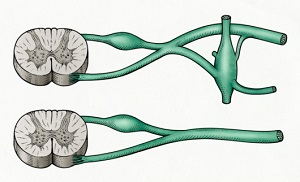Parasympathetic Nervous System
 The parasympathetic nervous system is part of the autonomic nervous system—the division of the nervous system that controls largely automatic processes such as digestion, respiration, and heart rate. It acts in concert with the sympathetic nervous system and conserves the body’s energy by bringing bodily functions back to homeostasis, particularly after the fight or flight response is activated by the sympathetic nervous system.
The parasympathetic nervous system is part of the autonomic nervous system—the division of the nervous system that controls largely automatic processes such as digestion, respiration, and heart rate. It acts in concert with the sympathetic nervous system and conserves the body’s energy by bringing bodily functions back to homeostasis, particularly after the fight or flight response is activated by the sympathetic nervous system.
Structure and Location of Parasympathetic Nervous System
Parasympathetic nerves originate in the middle of the spinal column, arising from the spinal nerves of the central nervous system. Axons of this system are typically quite long and extend into ganglia in the rest of the body. These ganglia are typically located in or near organs, allowing the parasympathetic nervous system to rapidly send and receive signals throughout the body. Because the parasympathetic nervous system originates in the spinal column, it does not typically require conscious thought to elicit a reaction.
What Does the Parasympathetic Nervous System Do?
While the sympathetic nervous system is often referred to as the fight-or-flight-part of the body, the parasympathetic nervous system is sometimes called the feed-and-breed system because it regulates more mundane processes that are vital for the maintenance of normal life. The functions of this system include:
- Regulating digestion, including urination and defecation
- Regulating sexual arousal
- Slowing the heart rate and lowering the blood pressure after the sympathetic nervous system has activated the fight or flight response
Without the parasympathetic nervous system, the monitoring and regulation of everyday body processes would be impossible. Further, the parasympathetic nervous system plays a vital role in maintaining both mental and physical health by helping the body to calm down from stress reactions that elevate blood pressure, dilate the pupils, and divert energy from other body processes to fighting or fleeing.
References:
- American Psychological Association. APA concise dictionary of psychology. Washington, DC: American Psychological Association, 2009. Print.
- Colman, A. M. (2006). Oxford dictionary of psychology. New York, NY: Oxford University Press.
Last Updated: 08-17-2015
- 5 comments
- Leave a Comment
lucas
February 25th, 2017 at 9:45 PMNotes
Annmarie
May 18th, 2020 at 10:09 AMI’m so sexually frustrated my life feels really down and I’m trying hard not to cheat.my boyfriend only thinks of him in the bedroom so if I ask about me he gets mad and says I’m being about myself. I dont know what else to do. I live oral sex done to me and it’s not like he hasn’t done it before. I even ask him if there is something wrong with me? He says nothing is wrong. But I really need some hot intimate sex I’m over stressed and hyper I need advice
Deb C
February 27th, 2017 at 8:30 PMI had a fall on February 20th 2014. It was near my sacrum ,Coccyx area ….within a month I was having constipation then it went to loose stools then it went to diarrhea. Could my fall on my tailbone area cause my bowel problems to develop? I never had problems before my fall.
Leave a Comment
By commenting you acknowledge acceptance of GoodTherapy.org's Terms and Conditions of Use.

